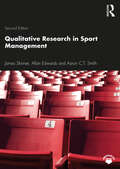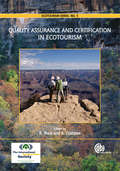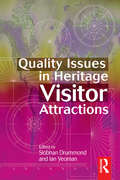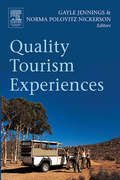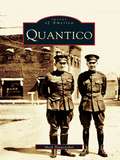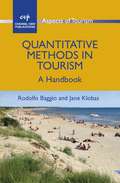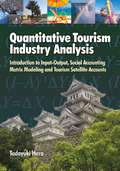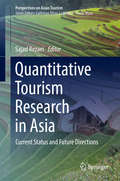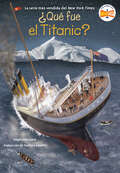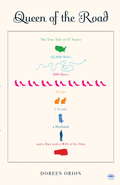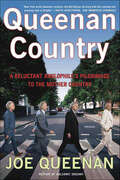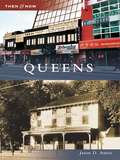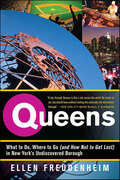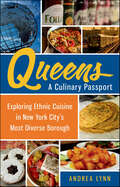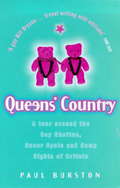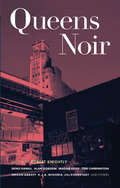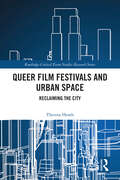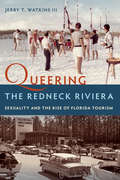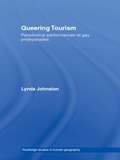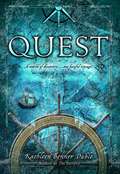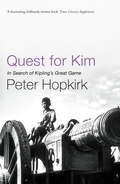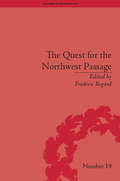- Table View
- List View
Qualitative Research in Sport Management
by James Skinner Allan Edwards Aaron C.T. SmithGood qualitative research can help sport management researchers and industry professionals solve difficult problems and better understand their organisations, stakeholders and performance. Now in a fully revised and extended new edition, this book is a user-friendly introduction to qualitative methods in sport management. Covering the full research process from research planning to reporting results, this edition includes expanded coverage of cutting-edge areas including digital and social media research, critical realism, and social network analysis. The book examines the reflective and interrogative processes required for developing effective qualitative research questions and includes a deeper discussion of ontology and epistemology in the light of today’s rapidly changing society. It takes the reader step-by-step through essential and emerging qualitative methods, from actor network theory and ethnography to computer-assisted data analysis and sampling typologies. Every chapter includes examples of real qualitative research, including shorter "research briefs" and extended case studies, reflecting the exciting qualitative research that is currently occurring in sport business and management, and highlighting the links between research and sport management practice. This is essential reading for courses in sport management, sport business, sport policy, sport marketing, sport media, and communications. It provides students, researchers, and practitioners with the knowledge and skills to undertake qualitative research while deepening their understanding of how the social world can be perceived and interpreted through a particular theoretical lens. Useful online materials include recommended readings and PowerPoint slides.
Quality Assurance and Certification in Ecotourism
by Rosemary Black Alice CrabtreeThis book explores solutions to the problems of inconsistency and even exploitation of the term ecotourism through examples, case studies and a discussion of quality control and certification.
Quality Issues in Heritage Visitor Attractions
by Ian Yeoman* Quality as a tool for success*Covers a diverse range of quality issues and theories in the context of heritage attractions* Well-respected international contributor team of academics and practitionersHeritage Tourism is the fastest growing component of the tourism market. Tourists have more choices than ever and their past experiences and future expectations make them even more discerning customers. A focus on quality can assist with customer satisfaction and business excellence. This new book on Quality issues brings together a range of specialists who lead us from the evolution of quality to our current position on the quality roadmap. It provides a toolkit to assist on the continuous quality improvement journey and presents a vision of what lies ahead in this new millennium.'Quality Issues in Heritage Visitor Attractions' will prove an invaluable guide for students and practitioners in the field s of Heritage, Visitor Attractions and Tourism in general.Divided into six sections this text presents a different 'flavour' of quality by looking at aspects such as critical success factors for heritage organizations, methods of quality improvement, developing the concept and offering, quality tools for managers, managing the quality workforce and the future.
Quality Tourism Experiences
by Gayle Jennings Norma Polovitz NickersonThe theme of the edited book acknowledges the multiple meanings of quality tourism experiences, the diverse contexts in which tourism occurs, and the varied stakeholders associated directly or indirectly with the phenomenon of tourism."Quality tourism experiences" is a widely used phrase in tourism and tourism-related texts and is associated with a diversity of meanings and usage. Meanings are ascribed by industry/business, government agencies, tourists, community and academics. The phrase is used to argue, for example, for positive social impacts, economic benefits, environmental protection, government policy formulation, discrimination between tourism products as well as issues associated with sustainability. Subsequently, the phrase "quality tourism experiences" is not a nomothetic term but rather one associated with multiple interpretations and meanings. The book"s overarching tenet is that "quality" is a socially constructed term (as are the terms tourism experiences). Authors investigate the role of the mass media, the role of travel providers, the role of host communities, the role of tourists, and the role of "government" at all its levels. From an academic perspective, quality tourism experiences are associated with interaction between host and guest (tourists and community perspectives), the classification of type of tourism product (tourism industry and government sector perspectives), market differentiation and development, tourist perspectives, the notion of an integrated system and benefits from an economic perspective.Similarly, quality is associated with different meanings and is used in a variety of contexts within tourism literature. For example quality is associated with service quality, quality assurance/auditing and control, perceptions of quality at an individual/business/community level, that is, stakeholder level, and in regard to product and market differentiation. The book draws together writers from different backgrounds and interdisciplinary interests and research methodologies, as a consequence, the book provides a model of the way researchers can work together to illuminate an area and to provide multiple representations and interpretations of that area. Moreover the book demonstrates interdisciplinary, transdisciplinary and intradisciplinary approaches and collaborations.Kathleen Andereck, Ph.D., Arizona State University WestSue Beeton, Ph.D., La Trobe UniversityHeather E. Bowen, Ph.D., George Mason UniversityKelly S. Bricker, Ph.D., West Virginia University Barbara Carmichael, Ph.D., Wilfrid Laurier UniversityMaggie Daniels, Ph.D., George Mason UniversityGayle Jennings, Ph.D., Central Queensland UniversityClaudia Jurowski, Ph.D, Northern Arizona UniversityDeborah Kerstetter, Ph.D., Penn State UniversityNorma Nickerson, Ph.D., University of MontanaLori Pennington-Gray, Ph.D., University of Florida Carla Almeida Santos, Ph.D., University of Illinois at Urbana-Champaign Betty Weiler, Ph.D., Monash University
Quantico (Images of America)
by Mark BlumenthalLocated in the northern Virginia hills just south of our nation's capital, Marine Corps Base Quantico is known throughout the world as the Crossroads of the United States Marine Corps. Images of America: Quantico takes the reader on a visual tour of Quantico's evolution-through World War I, interwar service as an expeditionary base, and the development of the amphibious capabilities made famous by the Marines in World War II. The impact of famous Marines, including Generals John A. Lejeune and Smedley D. Butler, is explored, as is the unique relationship between the base and the Town of Quantico, the only United States city surrounded by a military base.
Quantitative Methods in Tourism
by Jane Klobas Rodolfo BaggioTourism studies often deal with complex mixes of external and local factors and the attitudes, perceptions and actions of tourists themselves. In seeking to understand individual elements of this mix, or the results of interactions between them, tourism authorities, managers and researchers often collect quantitative data, but until now the few existing guides to understanding quantitative data have been either very simple or very complicated. This book provides a guide to dealing with real-world data and goes beyond the methods usually covered in introductory textbooks. The first part considers key issues associated with using well known methods to produce valid and reliable models of real-world phenomena, emphasizing issues in data selection, approaches to factor and cluster analysis, and mathematical modelling using regression methods (including logistic regression) and structural equation modelling. The second part covers new approaches to modelling: maximum likelihood estimation, simulation and agent-based modelling. Each chapter includes extensive references to additional reading, and an appendix summarises the software introduced in the book. The book provides many practical examples of applications to tourism research, considers practical issues associated with application of quantitative techniques, and discusses common pitfalls and how to identify and remedy them. The result is a guide to quantitative methods in tourism that de-mystifies both simple and apparently complex techniques and makes them more accessible to tourism researchers.
Quantitative Tourism Industry Analysis
by Tadayuki HaraQuantitative Tourism Industry Analysis is the first book to deal with the input-output, social accounting matrix in a way which readers from a non-economics or non-mathematical background can follow, in order to understand how useful their application would be for tourism industry analysis. It acquaints readers with useful applications of economic modelling without the unnecessary burden of higher algebra, so that they will understand concepts of the economics measurement system, Tourism Satellite Accounts (TSA) methodology.Quantitative Tourism Industry Analysis offers a new set of economic tools for tourism policy analysis, ideal for those with a non-mathematical background.
Quantitative Tourism Research in Asia: Current Status And Future Directions (Perspectives on Asian Tourism)
by Sajad RezaeiThe purpose of this book is twofold. First, this book is an attempt to map the state of quantitative research in Asian tourism and hospitality context and provide a detailed description of the design, implementation, application, and challenges of quantitative methods in tourism in Asia. Second, this book aims to contribute to the tourism literature by discussing the past, current and future quantitative data analysis methods.The book offers new insights into well-established research techniques such as regression analysis, but goes beyond first generation data analysis techniques to introduce methods seldom – if ever – used in tourism and hospitality research. In addition to investigating existing and novel research techniques, the book suggests areas for future studies. In order to achieve its objectives the analysis is split into three main sections: understanding the tourism industry in Asia; the current status of quantitative data analysis; and future directions for Asian tourism research.
¿Qué fue el Titanic? (¿Qué fue?)
by null Stephanie Sabol Who HQDurante más de cien años la gente ha estado cautivada por el desastroso hundimiento del Titanic, que se cobró más de 1500 vidas. Ahora los jóvenes lectores pueden conocer por qué se hundió el gigantesco barco y cómo fue descubierto 75 años después.For more than one hundred years, people have been captivated by the disastrous sinking of the Titanic that claimed over 1,500 lives. Now young readers can find out why the great ship went down and how it was discovered seventy-five years later.A las 2:20 a. m. del 15 de abril de 1912, el Royal Mail Steamer Titanic, el barco de pasajeros más grande de esa época, encontró su catastrófico final después de estrellarse con un iceberg. De los 2240 pasajeros y tripulantes a bordo, solo 705 sobrevivieron. Más de cien años después, los lectores de hoy estarán intrigados por el misterio que rodea a este barco que originalmente fue catalogado como &“insumergible&”.At 2:20 a.m. on April 15, 1912, the Royal Mail Steamer Titanic, the largest passenger steamship of this time, met its catastrophic end after crashing into an iceberg. Of the 2,240 passengers and crew onboard, only 705 survived. More than one hundred years later, today's readers will be intrigued by the mystery that surrounds this ship that was originally labeled "unsinkable."
Queen of the Road: The True Tale of 47 States, 22,000 Miles, 200 Shoes, 2 Cats, 1 Poodle, a Husband, and a Bus with a Will of Its Own
by Doreen OrionA pampered Long Island princess hits the road in a converted bus with her wilderness-loving husband, travels the country for one year, and brings it all hilariously to life in this offbeat and romantic memoir.Doreen and Tim are married psychiatrists with a twist: She's a self-proclaimed Long Island princess, grouchy couch potato, and shoe addict. He's an affable, though driven, outdoorsman. When Tim suggests "chucking it all" to travel cross-country in a converted bus, Doreen asks, "Why can't you be like a normal husband in a midlife crisis and have an affair or buy a Corvette?" But she soon shocks them both, agreeing to set forth with their sixty-pound dog, two querulous cats--and no agenda--in a 340-square-foot bus.Queen of the Road is Doreen's offbeat and romantic tale about refusing to settle; about choosing the unconventional road with all the misadventures it brings (fire, flood, armed robbery, and finding themselves in a nudist RV park, to name just a few). The marvelous places they visit and delightful people they encounter have a life-changing effect on all the travelers, as Doreen grows to appreciate the simple life, Tim mellows, and even the pets pull together. Best of all, readers get to go along for the ride through forty-seven states in this often hilarious and always entertaining memoir, in which a boisterous marriage of polar opposites becomes stronger than ever.
Queen of the Road
by Doreen OrionA pampered Long Island princess hits the road in a converted bus with her wilderness-loving husband, travels the country for one year, and brings it all hilariously to life in this offbeat and romantic memoir. Doreen and Tim are married psychiatrists with a twist: She’s a self-proclaimed Long Island princess, grouchy couch potato, and shoe addict. He's an affable, though driven, outdoorsman. When Tim suggests “chucking it all” to travel cross-country in a converted bus, Doreen asks, “Why can’t you be like a normal husband in a midlife crisis and have an affair or buy a Corvette?” But she soon shocks them both, agreeing to set forth with their sixty-pound dog, two querulous cats—and no agenda—in a 340-square-foot bus. Queen of the Roadis Doreen’s offbeat and romantic tale about refusing to settle; about choosing the unconventional road with all the misadventures it brings (fire, flood, armed robbery, and finding themselves in a nudist RV park, to name just a few). The marvelous places they visit and delightful people they encounter have a life-changing effect on all the travelers, as Doreen grows to appreciate the simple life, Tim mellows, and even the pets pull together. Best of all, readers get to go along for the ride through forty-seven states in this often hilarious and always entertaining memoir, in which a boisterous marriage of polar opposites becomes stronger than ever.
Queenan Country: A Reluctant Anglophile's Pilgrimage to the Mother Country
by Joe QueenanIn this hilarious romp through England, one of America's preeminent humorists seeks the answer to an eternal question: What makes the Brits tick? One semitropical Fourth of July, Joe Queenan's English wife suggested that the family might like a chicken vindaloo in lieu of the customary barbecue. It was this pitiless act of gastronomic cultural oppression, coupled with dread of the fearsome Christmas pudding that awaited him for dessert, that inspired the author to make a solitary pilgrimage to Great Britain. Freed from the obligation to visit an unending procession of Aunty Margarets and Cousin Robins, as he had done for the first twenty-six years of their marriage, Queenan decided that he would not come back from Albion until he had finally penetrated the limey heart of darkness.His trip was not in vain. Crisscrossing Old Blighty like Cromwell hunting Papists, Queenan finally came to terms with the choochiness, squiffiness, ponciness, and sticky wicketness that lie at the heart of the British character. Here he is trying to find out whose idea it was to impale King Edward II on a red-hot poker-and what this says about English sexual politics. Here he is in an Edinburgh pub foolishly trying to defend Paul McCartney's "Ebony and Ivory." And here he is, trapped in a concert hall with a Coventry-based all-Brit Eagles tribute band named Talon who resent that they are nowhere near as famous as their evil nemeses, the Illegal Eagles. At the end of his epic adventure, the author returns chastened, none the wiser, but encouraged that his wife is actually as sane as she is, in light of her fellow countrymen.
Queens (Then and Now)
by Jason D. AntosThe borough of Queens, New York, has seen many historical and geographical changes. Marshlands, woods, and farms gave way to factories, thriving communities, and the nation's premier arterial highway system. Queens offers a rare look at New York City's largest borough, featuring many never-before-seen images.
Queens: What to Do, Where to Go (and How Not to Get Lost) in New York's Undiscovered Borough
by Ellen FreudenheimDiscover Queens, New York City's Best-Kept Secret!Manhattan is touristy; Brooklyn is turning mainstream; and Queens is now the up-and-coming borough in New York. With food from every corner of the world, major sporting venues, quirky nightlife, and rich history and cultural institutions to boot, Queens has just about everything a visitor could want. This handy reference explores Queens neighborhood by neighborhood, and even those familiar with the borough will discover new hidden gems that they never knew existed.This guidebook includes:* Detailed coverage and maps of the major neighborhoods like Astoria, Jackson Heights, Long Island City, Forest Hills, and Sunnyside* Daytrips to interesting but more far-flung spots in the borough like Jamaica Bay National Wildlife Refuge* The best restaurants serving every possible type of cuisine* Cultural attractions and nightlife spots worth the subway fare from Manhattan.* Contributions from major figures in the community, including the president of Queens College and the director of PS1.
Queens: A Culinary Passport
by Andrea LynnEveryone knows New York City is the culinary epicenter of the United States. And while Manhattan gets Michelin stars and Brooklyn gets blogger hype, real culinary fanatics know that authentic ethnic food experiences happen in the restaurants of Queens. There, New York's celebrated ethnic diversity is the most potent, with more than one million foreign-born residents. This means food lovers can travel the globe without using any vacation time: take a culinary tour of China, sip a frappe in Greece, dine on authentic Italian sausage—all without ever leaving Queens!Queens: A Culinary Passport welcomes visitors to the borough, serving as your guide to more than 40 hand-picked ethnic restaurants and food stands, complete with chef profiles and recipes for recreating signature dishes at home. Also included are highlights of not-to-be-missed hidden spots, like ethnic grocery stores stocked with multicultural essentials, fresh-from-the-sea fish markets, and delis that turn out freshly made mozzarella and sopressata. For Queens novices, the book includes easy-to-follow subway directions and even detailed neighborhood walking tours, ensuring that your next trip to Italy, India, Greece, Latin America, and China is only a borough away.
Queens' Country: A Tour Around the Gay Ghettos, Queer Spots and Camp Sights of Britain
by Paul BurstonThe gay community'. For years Paul Burston has heard talk of this fabled people, whose votes are wooed by politicians, whose pink pounds are courted by advertising executives and whose alternative lifestyle is derided by defenders of family values. But he's never been quite sure who they were. So he decided to set off and try to find them for himself. His travels around gay Britain take in a wide cross-section of people and places, from his own childhood in South Wales to middle-aged gay men enjoying a beach party in Bromley, from the gay couple running their own massage parlour in Bristol to gay Young Conservatives in Derbyshire.Along the way, he comments on the hotly debated gay issues of the day; cappuccino-culture consumerism and community politics; the age of consent and the narcissistic preoccupation with youth; backrooms in bars and gay loft conversions. Witty, irreverent and fiercely intelligent, QUEENS' COUNTRY presents the rich diversity - and occasional cultural poverty - of the forces shaping gay life in modern Britain.
Queens' Country: A Tour Around the Gay Ghettos, Queer Spots and Camp Sights of Britain
by Paul BurstonThe gay community'. For years Paul Burston has heard talk of this fabled people, whose votes are wooed by politicians, whose pink pounds are courted by advertising executives and whose alternative lifestyle is derided by defenders of family values. But he's never been quite sure who they were. So he decided to set off and try to find them for himself. His travels around gay Britain take in a wide cross-section of people and places, from his own childhood in South Wales to middle-aged gay men enjoying a beach party in Bromley, from the gay couple running their own massage parlour in Bristol to gay Young Conservatives in Derbyshire.Along the way, he comments on the hotly debated gay issues of the day; cappuccino-culture consumerism and community politics; the age of consent and the narcissistic preoccupation with youth; backrooms in bars and gay loft conversions. Witty, irreverent and fiercely intelligent, QUEENS' COUNTRY presents the rich diversity - and occasional cultural poverty - of the forces shaping gay life in modern Britain.
Queens Noir (Akashic Noir)
by Robert KnightlyBrand-new stories by: Denis Hamill, Malachy McCourt, Maggie Estep, Megan Abbott, Robert Knightly, Liz Martínez, Jill Eisenstadt, Mary Byrne, Tori Carrington, Shailly P. Agnihotri, K.j.a. Wishnia, Victoria Eng, Alan Gordon, Beverly Farley, Joe Guglielmelli, and Glenville Lovell.Includes the story "Bucker's Error," winner of the 2009 Edgar Award (Robert L. Fish Memorial Award)Robert Knightly is a trial lawyer in the Criminal Defense Division of the Queens Legal Aid Society. In another life, he was a lieutenant in the New York City Police Department. President of the New York chapter of Mystery Writers of America, he was born and raised in New York City and lives in Queens.
Queer Film Festivals and Urban Space: Reclaiming the City (Routledge Critical Event Studies Research Series.)
by Theresa HeathThis timely and innovative book argues that queer film festivals reclaim urban space for queer women and other marginalised queer subjects through the mobilisation of both material and diegetic space.It is a response to the loss of queer urban venues and community spaces across across many parts of the Global North and a claim for the political potential of queer film festivals in the context of late-stage capitalism. Drawing from critical events studies, film and film festival scholarship, archival research, cultural geography, and research in the creative industries, the book deploys an interdisciplinary arsenal of tools in order to understand the complexity of festival space. Covering the period from 1980 to the present, the volume posits original case studies of two long-running festivals, as well as analysis of ephemeral, grassroots events. This thorough and critical exploration offers significant insight into the strategies deployed by queer film festivals to carve out queer geographies in the city, and the potential of event-driven place-making to construct alternative morphologies and more equitable approaches to urban space.This volume will be of pivotal interest to students, scholars, and academics of critical event and festival studies, film and film festival studies, cultural, creative, and media industries, cultural geography, sociology, and urban studies, as well as those with an interest in these areas more generally.
Queering the Redneck Riviera: Sexuality and the Rise of Florida Tourism
by Jerry T. Watkins IIIQueering the Redneck Riviera recovers the forgotten and erased history of gay men and lesbians in North Florida, a region often overlooked in the story of the LGBTQ experience in the United States. Jerry Watkins reveals both the challenges these men and women faced in the years following World War II and the essential role they played in making the Emerald Coast a major tourist destination. In a state dedicated to selling an image of itself as a “family-friendly” tropical paradise and in an era of increasing moral panic and repression, queer people were forced to negotiate their identities and their places in society. Watkins re-creates queer life during this period, drawing from sources including newspaper articles, advertising and public relations campaigns, oral history accounts, government documents, and interrogation transcripts from the state’s Johns Committee. He discovers that postwar improvements in transportation infrastructure made it easier for queer people to reach safe spaces to socialize. He uncovers stories of gay and lesbian beach parties, bars, and friendship networks that spanned the South. The book also includes rare photos from the Emma Jones Society, a Pensacola-based group that boldly hosted gatherings and conventions in public places. Illuminating a community that boosted Florida’s emerging tourist economy and helped establish a visible LGBTQ presence in the Sunshine State, Watkins offers new insights about the relationships between sexuality, capitalism, and conservative morality in the second half of the twentieth century.
Queering Tourism: Paradoxical Performances of Gay Pride Parades (Routledge Studies in Human Geography)
by Lynda JohnstonGay Pride parades are annual arenas of queer public culture, where embodied notions of subjectivity are sold, enacted, transgressed and debated. From Sydney to Rome, Queering Tourism analyses the paradoxes of gay pride parades as tourist events, exploring how the public display of queer bodies - the way they look, what they do, who watches them, and under what regulations - is profoundly important in constructing sexualized subjectivities of bodies and cities. Drawing on extensive collections of interviews, visuals and written media accounts, photographs, advertisements, and her own participation in these parades, Lynda Johnston gives a vibrant account of ‘queer tourism’ in New Zealand, Australia, Scotland and Italy. For each place, she looks at how the relationship between the viewer and the viewed produces paradoxical concepts of bodily difference, and considers how the queered spaces of gay pride parades may prompt new understandings of power and tourism. Examining the intersection of sexuality, space and tourism, and using empirical data gathered at Gay pride parades such as the Sydney Mardi Gras, New Zealand HERO Parade and World Pride Roma 2000, this important work produces a deconstructive account of tourism and presents new ways of thinking through the powerful processes of subjectivity formation.
Quest
by Kathleen Benner DubleRelates events of explorer Henry Hudson's final voyage in 1602 from four points of view, those of his seventeen-year-old son aboard ship, a younger son left in London, a crewmember, and a young English woman acting as a spy in Holland.
Quest for Kim: In Search Of Kipling's Great Game (In Search Of Kipling's Great Game Ser.)
by Peter HopkirkThis book is for all those who love Kim, that masterpiece of Indian life in which Kipling immortalized the Great Game. Fascinated since childhood by this strange tale of an orphan boy's recruitment into the Indian secret service, Peter Hopkirk here retraces Kim's footsteps across Kipling's India to see how much of it remains. To attempt this with a fictional hero would normally be pointless. But Kim is different. For much of this Great Game classic was inspired by actual people and places, thus blurring the line between the real and the imaginary. Less a travel book than a literary detective story, this is the intriguing story of Peter Hopkirk's quest for Kim and a host of other shadowy figures.
Quest for Kim: In Search Of Kipling's Great Game
by Peter HopkirkThis book is for all those who love Kim, that masterpiece of Indian life in which Kipling immortalized the Great Game. Fascinated since childhood by this strange tale of an orphan boy's recruitment into the Indian secret service, Peter Hopkirk here retraces Kim's footsteps across Kipling's India to see how much of it remains. To attempt this with a fictional hero would normally be pointless. But Kim is different. For much of this Great Game classic was inspired by actual people and places, thus blurring the line between the real and the imaginary. Less a travel book than a literary detective story, this is the intriguing story of Peter Hopkirk's quest for Kim and a host of other shadowy figures.
The Quest for the Northwest Passage: Knowledge, Nation and Empire, 1576–1806 (Empires in Perspective)
by Frédéric RegardThese essays trace the history of the British search for the Northwest Passage – the Arctic sea route connecting the Atlantic and Pacific oceans – from the early modern era to the start of the nineteenth century.
